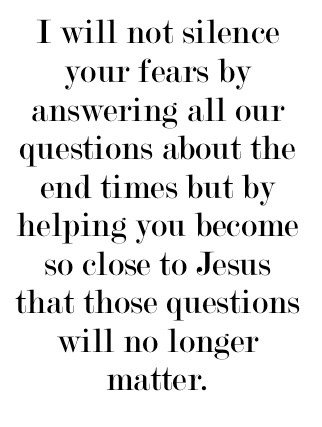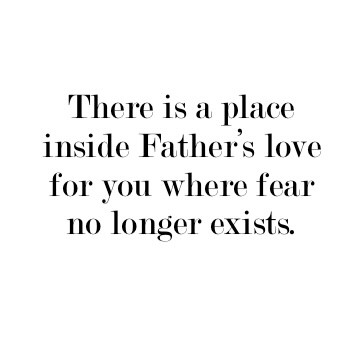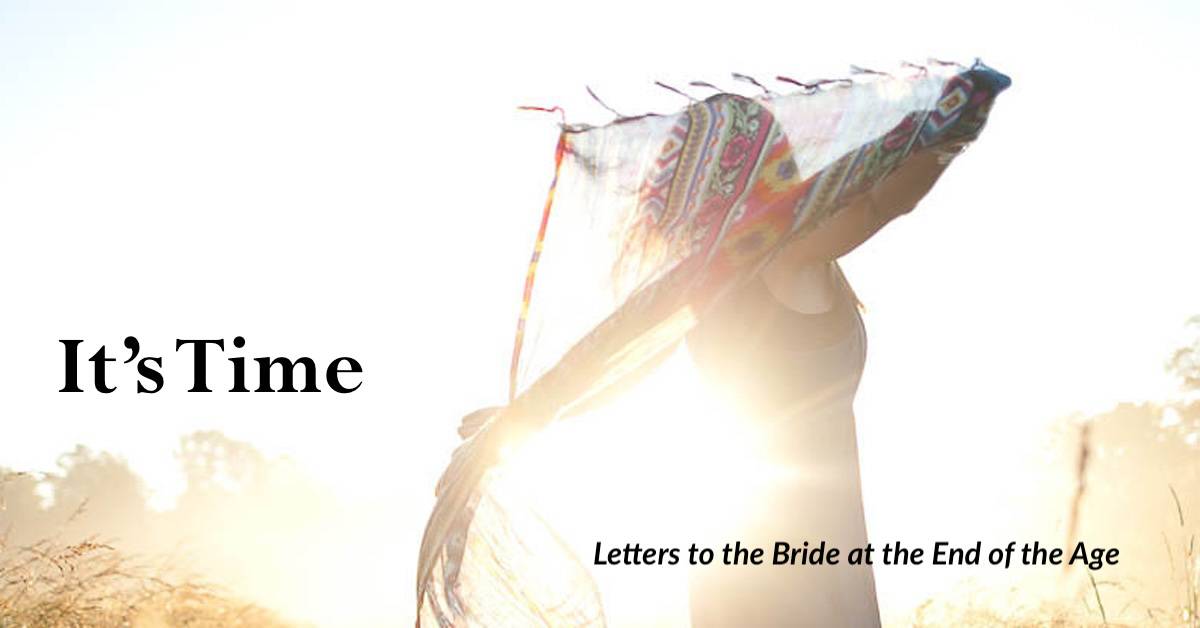Chapter 3: This Scares Me to Death
Note: This is the third in a series of letters written for the bride of Christ who are alive at the end of the age. Once complete, I’ll combine them into a book. You can start with Chapter 1 here. If you are not already subscribed to this blog and want to make sure you don’t miss any, you can add your name here.
_________________
Wayne, to be honest, your last two postings have given me quite a fright. I’ve always hated books and sermons about the end of the age, and I don’t ever read Revelation because it terrifies me. There seems to be so much devastation, wrath, and death. I find myself paralyzed to think that these days would possibly come in my lifetime.
— Sharon, HR director, mother of three and grandmother of one
Hi Sharon,
I’m so sorry my words have felt paralyzing to you. The last thing I want to do is provoke anyone’s fear, but I knew this book would do that. The end of the age is a terrifying prospect for many. Not only does it confront us with our own mortality but also the catastrophic circumstances that the Scriptures seem to say will surround his coming.
It speaks of the Day of the Lord in ominous terms. Religious leaders have focused on those since the prophets began to write about it toward the end of the Old Testament. Today books, movies, and preachers who pound on that theme think they can terrify people into right living. Keep in mind, however, most religions trade in fear because it makes it easier to manipulate people. And there are few passages that can be twisted to ramp up people’s fears more than the pages in Revelation about the end of the age.
The end of the age will bring death and destruction, and a new set of challenges to face—an antichrist figure, the mark of the beast, and natural disasters that will take the lives of many. I understand why most would prefer not to think about it, especially if their life on planet earth is pleasant. My daughter has a small dog who doesn’t enjoy the exuberance of our new puppy, Mandy. And yet, Mandy is fascinated with Lola, so she’s always trying to get in her face. Lola’s approach to this is just to turn her head away, pretending Mandy doesn’t exist. If she can’t see her, she’s not there, or so she thinks.
Of course she is wrong, and so are we if we think ignoring what challenges us won’t eventually catch up to us. The proverbial ostrich’s head-in-the-sand approach to fear won’t serve us well. Neither do we need to give in to fear when the Day of the Lord’s coming, which will be the second greatest day in human history, after his Resurrection.
Fear never leads us to Father’s wisdom, especially at the end of the age. This is the culmination of every good desire we’ve ever had and what our hearts long for in the frustration of living in the broken Creation. Jesus didn’t tell us his plans to make us cower in the corner, but to prepare ourselves for whatever might come in the joyful anticipation that our salvation draws near.
Even after all these centuries, I am convinced that Jesus will physically return to this planet as he foretold his followers. Will that be in my lifetime? I hope so. But at some future, yet unknown date, he will appear to complete his work of redemption, not only for his beloved, but for all of Creation.
Corrupt human governments will come to ruin, and Jesus will take his rightful throne as the highest authority over all. On that day the kingdoms of this world will become “the kingdom of our God and of His Christ.” Love and peace will flourish among humanity and the effects of the Fall on Creation will be reversed. Beauty will encompass our hearts as we engage him without the blinders of flesh or fears in the new heaven and new earth.
The only reason to fear is either because we’re afraid we haven’t done enough to be included in his family or because we don’t see that Jesus is strong enough to hold us through whatever difficulties come. That’s how preachers can even twist Jesus’s triumphant return into a terrifying moment of separation between those who are “ready” and those who are not. I remember one sermon that threatened, “If you have even one unconfessed sin between you and Jesus when he comes, you’ll be left behind.” Instead of being free to anticipate his coming with joy, we always had to be careful that we had done enough every day to be included in the Redeemed. There was no safety in his love for us, but only in our performance for him.
I hear from people all the time who are afraid they might be tricked into taking the mark of the beast and be rejected by God. That’s as old as people getting a Social Security number or a chip on their credit card. And it’s as fresh as those who were afraid it was slipped into the COVID vaccine as a nanobot. To fear such things, you have to be convinced that God is wanting to exclude people from his life and has concocted this as a Gotcha Test.
That would be like your dad telling you, if you consume alcohol, he will remove you from his will. Then, he sneaks some in the spaghetti sauce, so he can blame you for being disobedient. What kind of God is that? Not the God and Father of our Lord Jesus Christ. His desire is not to exclude people from redemption but to include all who will to come to him. Whatever the mark of the beast will be, it will be obvious and include a pledge of loyalty to darkness.
If the fear of being left behind is the stick some use to keep people faithful, the carrot is the rapture. Those who pass the Gotcha Tests will be raptured out before any challenging times come. Honest Scriptural interpretation does not naturally lend itself to this point of view. It has been concocted by people living in prosperous Western culture. Many followers of Jesus throughout Christian history and even around the world today suffer life-threatening challenges and persecution as well as great need and deprivation. To think that we get an easy out would have been unthinkable to the early Christians who considered it an honor to bear Jesus’s image and mission even to the risking of their own lives.
I realize none of this helps with your fears yet, Sharon, but bear with me, because the end of the age was never meant to catch those close to him unawares. Far from being a source of fear, his coming is a cause for anticipation and hope. The pain of those days is the surgery necessary to mend a broken hip or repair a clogged artery. We don’t focus on the process, but the healing.
So, how do you view his return? Many see the vengeful God coming to blast his enemies into oblivion. That’s not how I look at it. Jesus is coming to rescue his bride from all that wars against her and take her to himself. I realize that’s a difficult metaphor for most men. We may prefer the image of a warrior armed for battle to a bride decked out in a white gown. But in this picture, we are that bride; he is our champion, coming to rescue us and the world from darkness. If you can’t get comfortable with that reality, you’ll find yourself trying to do by human effort what only Jesus can do in his authority.
The catastrophic events of the last day seem to come not because God needs to throw a tantrum. God may not be their primary cause; it’s simply where humanity ends up when they serve their flesh or the god of money. The tragedies that result will give even more people the opportunity to come to the end of themselves and turn to him.
That may mean days of persecution, particularly for those who live in the truth instead of playing the world’s games. The enemy and the world will react like jealous girlfriends, taking out their anguish on the bride. The bride’s focus, however, is never on her former girlfriends; her focus is steadfastly fixed on her beloved.
While the book of Revelation lays bare the catastrophic events that will come in the last days, it’s theme is the ultimate triumph of the Lamb and his reunion with his Bride. I’m pretty sure these events will play out very differently from the way our popular books imagine it. Much of Revelation is a mystery still unfolding, a metaphor that people take literally to their peril.
What Revelation reveals most clearly are the extraordinary promises Jesus makes to the Bride—those who overcome with him. He preserves them in the face of destruction and holds them in his hands even through persecution. Even those who may die in the conflicts of those days will be surrounded and comforted by the presence of the Holy One. He will have complete victory over the powers of darkness and will be enthroned above all powers and the forces of evil will be utterly destroyed. This is not wrath for his children; it’s a rescue.
Thus, the bride looks at the Day of the Lord quite differently. Even if it comes in chaos, it concludes in beauty and wonder. This is the day of her wedding as Jesus comes to redeem her out of this broken world. He will prepare her so that even in those days she can stand before him without spot or wrinkle. This is not a day to fear, but one to embrace with him. The bridegroom is coming to redeem his bride out of the chaos of this present, evil age. If that doesn’t excite you, you need a better grasp of who your Redeemer is. Any bride terrified of her wedding day is marrying the wrong man.
Sharon, I will not silence your fears by answering all our questions about the end times but by helping you become so close to Jesus that those questions will no longer matter. Jesus didn’t tell us these things to scare us, but to let his love prepare us for the day of his redemption. That’s as critical for what you face in your life today as it will be at the end of the age. Any fear causes us to slip into self-protection mode, which makes it difficult to recognize how he is at work around us. This is where we make our worst decisions, often with our best intentions.
Fear shows us where we need to attend to our relationship with him and be more attuned to his love. Whenever you find yourself afraid, take some time to sit in that fear with Jesus. Face it head-on; examine it with him. Ask him why you’re afraid. Let him respond with insight that will invite you closer. I often ask him, “What is it about your love that I don’t yet know, that if I knew it, I wouldn’t be afraid here?”’
John wrote to us, “Perfect love casts out fear,” and he did so not to make us feel guilty when we are afraid but to let us know that there is a place inside Father’s love for you where fear no longer exists. Only he can show you how to live there; and it’s a process involving many facets we’ll look at throughout this book.
Begin with your smaller fears and ask him to show you how to bring them inside his love. Don’t focus on the fear but on the love and his extravagant care for you. Watching how he guides you through difficult circumstances will make you more aware of his presence. When he doesn’t alleviate your fear the way you want, you’ll have the opportunity to discover that God thinks very differently than you do. Watch how he works, and it will change the way you live in the world. Finding freedom from fear is not convincing ourselves logically that our fears are unfounded, or by hoping that God is greater than our fear (though he certainly is). Your fear will dissipate as he displaces it with his love.
 Don’t think you have to be perfect to grow here; it’s a process. When I find myself afraid, I realize there’s a way to grow in him that will consume it. It may take weeks or even months, depending how deep the fear is, but he will teach you so much about yourself and him that you will notice it bearing fruit in many other areas of your life as well.
Don’t think you have to be perfect to grow here; it’s a process. When I find myself afraid, I realize there’s a way to grow in him that will consume it. It may take weeks or even months, depending how deep the fear is, but he will teach you so much about yourself and him that you will notice it bearing fruit in many other areas of your life as well.
So, while those may be painful times, it is only the process that will bring great joy for those on whom the end of the age has come. He is not just coming to finish redemption’s story; he will also hold the redeemed tightly through the whole process. It is the nature of the bride to focus the fullness of her heart on her betrothed who comes to claim her as his own and with her, introduces a new heaven and a new earth. No longer filled with pain and sorrow and sickness and disease and separation and loss and loneliness, it will flood our senses with joy, wonder, beauty, light, and life. And we get to share it with him and each other for all of time.
Over the last three years, I’ve endured the most challenging crises of my life, including the unmerited rejection of people I love dearly. I’ve never traversed such incredible darkness for so long, but in doing so I found a depth of trust in him beyond any unforeseen event or circumstance. That has left me changed in ways I never imagined.
The reason I’m writing this book is to help those like you discover a similar place in their own hearts for Jesus to develop that trust in them. There is a way through your darkest fears and the chaos of declining civilization. This is what his love was always meant to shape in us, so that we no longer need to be tossed about by our fears, but live at rest in his love.
Then we can join the chorus where the Spirit and the Bride speak as one voice, “Come!”
_________________________
You can access previous chapters here. or Continue to Chapter 4.




